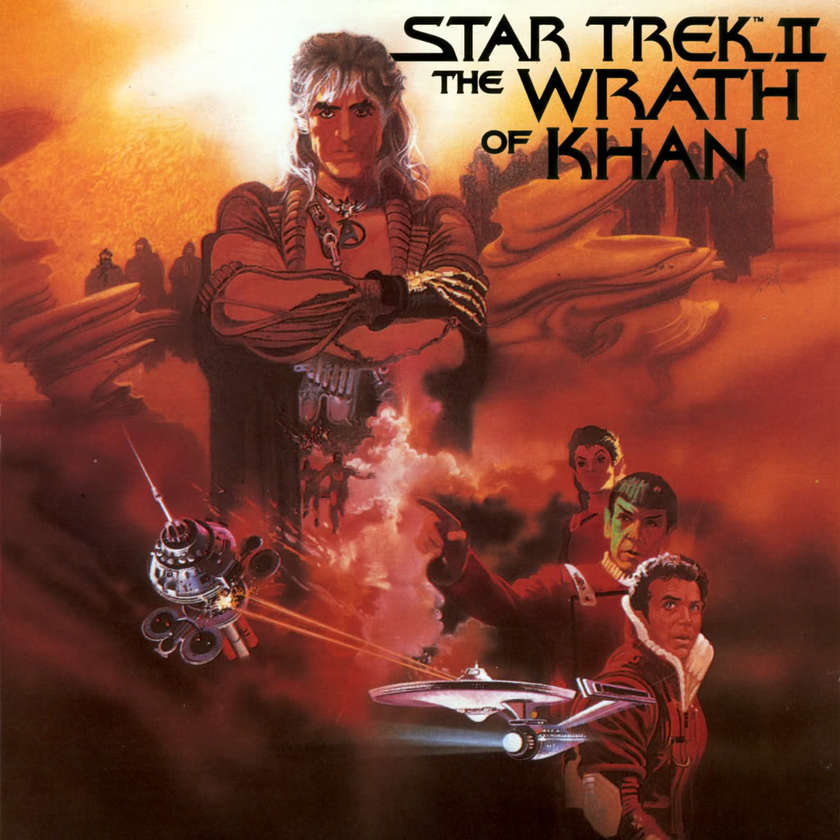As I mentioned yesterday, I recently spent five hours watching Star Trek TV and movies. To be honest, the only reason I watched “Space Seed” was because I really wanted to watch The Wrath of Khan again. For me when it comes to Star Trek movies, there’s The Wrath of Khan, The Search for Spock, and everything else. When it comes to 1982 in film, there’s The Wrath of Khan, Rocky III, and, well, there’s some other good stuff too.
E.T. the Extra-Terrestrial traumatized, okay?
Fifteen years have passed the events of “Space Seed,” which ended with Kirk marooning Khan, McGivers, and the rest of Khan’s people on Ceti Alpha V, a perfectly habitable planet. Of course, Kirk and company never gave the warlord another thought, and the Federation apparently didn’t either. Six months after Kirk moved on Ceti Alpha VI exploded, turning Khan’s new kingdom into a hostile wasteland. And no one noticed.
McGivers didn’t survive.
So when Chekov beams down to the planet, thinking it’s Cetil Alpha VI, and bumps into Khan, he’s more than a little alarmed. But Khan seizes the chance to escape his prison and take revenge on Kirk. What follows is a sort of Moby Dick story, where Khan is Ahab and Kirk is the White Whale (no offense to William Shatner).
The hunt is on.
Kirk, now an admiral, is adjusting to late middle age. He needs glasses and misses being out in the final frontier. It’s his job to inspect the retrofitted Enterprise and her crew, now captained by Spock. He handles it with wry amusement, though we can see he’s an unhappy man. When Khan attacks the science station where Kirk’s former lover Dr. Carol Marcus and their son, David, are working, he responds to their distress call without hesitation, despite the rookie crew.
James T. Kirk doesn’t refuse a call to adventure.
While “Space Seed” started with philosophical debate before turning to fisticuffs, the movie sequel gets right to the action. The themes aren’t as deep and it devotes itself entirely to the action (a wise correction to the heady snoozefest that was Star Trek: The Motion Picture), which isn’t to say that film is mindless action. Khan’s wounded pride and thirst for revenge are in sharp contrast with Kirk’s humility and Spock’s selflessness.
You read that right: Kirk’s humility.
A long life lived honestly brings wisdom, and with wisdom comes humility.
Kirk and company aren’t spring chickens anymore, but if anything they’re better than they ever were. They’re just as driven and capable as they were in their youth, and now with more life behind them than ahead, they have wisdom. And the storytellers respect that. Imagine if the movie were made today. Kirstie Ally’s Lt. Saavik, the young, female, second in command, is a dream come true for contemporary screenwriters. But does she nag these old men, outshining and correcting them?
No. She turns to them for wisdom.
The Wrath of Khan is a slam-bang sci-fi adventure movie, with dignity. The limitations of age are never denied, nor is the significance of experience. It’s a very human story, and humanity (with all its fading glories) is still good. Khan, the next step in human evolution, is just as flawed. But having lived in a world where he is king he lacks experience and humility, and it’s his fatal flaw.
Literally.
In addition to all that, the movie is perfectly paced. The minutes fly by as the action ebbs and flows, giving us time to laugh, breathe, mourn, and process before the next battle. There’s a sense of awe when we see the vastness of space and the majestic spaceships that man has built to explore it. We’re never cheated in those moments by snarky dialog or ironic music. Respect is given to the audience, which I gladly return. And I'll return, again and again.
They don’t make’em like this anymore.

























